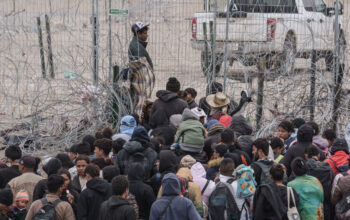
G20 divisions over Ukraine
The top diplomats from the U.S. and Russia held their first face-to-face meeting since Russia’s invasion of Ukraine. Antony Blinken, the U.S. secretary of state, met with Russia’s foreign minister, Sergey Lavrov, on the sidelines of a meeting of the Group of 20 countries in New Delhi yesterday that was dominated by tensions over the war.
The meeting suggested that the Biden administration wanted to keep lines of communication with Russia open even as Blinken told Lavrov that the U.S. would support Ukraine in its defense against Russia “for as long as it takes.”
At the G20 meeting, U.S. officials braced for a clash with China and India over the war. China has called for peace talks, a position that U.S. officials dismiss as a smoke screen that allows Russia and its partners to cast themselves as the reasonable parties. Russia and the West have argued for months over which side is more willing to negotiate. Blinken said this week that the U.S. saw “zero evidence” that President Vladimir Putin was serious about peace talks.
At the end of the meeting, the G20 diplomats issued a lower-level chair’s statement, rather than a consensus communiqué, because Russia and China refused to approve a denunciation of Russia’s war on Ukraine.
India: Despite Western prodding and a deepening relationship with the U.S., India has refrained from condemning Russia’s war in Ukraine while pushing for a diplomatic solution. India sees its G20 presidency as an opportunity to put a stamp on its global rise and push for a broad development agenda, a goal that could be derailed by sparring over Ukraine.
U.S. support: While Blinken showed strong U.S. backing for Ukraine at the G20, polls show public support in the U.S. for arming Ukraine is softening, and the two leading Republican presidential candidates are increasingly speaking out against U.S. involvement in the war.
Iran investigates suspected poisonings
More than 800 schoolgirls in at least 10 cities in Iran have come down with respiratory, cardiac and neurological symptoms, possibly because they were poisoned, senior officials said.
The first reports of girls falling sick emerged three months ago in the city of Qom, which is about 80 miles southwest of Tehran. For months, the government dismissed the cases, but the rise in the number of sick schoolgirls meant the illnesses could no longer be ignored. Videos circulated widely showing girls collapsing to the ground, gasping for air and lying on emergency room beds.
The State of the War
On Wednesday, Ahmad Vahidi, Iran’s minister of the interior, said that an investigation into what some officials called the school attacks had begun, but he said that no arrests had been made and that the motive was unclear.
Alireza Monadi, the head of Parliament’s education committee, said this week that the schools had been deliberately attacked and that toxicologists had identified nitrogen gas as the toxin. Monadi said the motive appeared to be to prevent girls from attending schools, raising concerns about Islamic extremism.
Context: Women and girls have led the recent protests demanding an end to the Islamic Republic. In response, the government has interrogated students and raided schools. In at least one case, a teenage girl was killed during a raid.
Quotable: “These appear to be serious coordinated attacks to create fear among the girls and their families in the context of girls partaking in the protests and being penalized for it,” an Iran researcher for Human Rights Watch said.
Tunisia cracks down on migrants
President Kais Saied of Tunisia publicly vilified sub-Saharan African migrants in a tirade in February, sweeping them up in a widening crackdown that has targeted politicians, journalists, activists, judges and others who have failed to bow to his one-man rule.
Even Saied’s critics were shocked by his remarks, which mined the deep vein of prejudice against dark-skinned people in Tunisia.
“The unspoken goal behind these successive waves of irregular migration is to consider Tunisia a purely African country, with no affiliation to the Arab and Islamic nations,” he said.
Tunisia is home to an estimated 20,000 sub-Saharan Africans. Since Saied’s speech, sub-Saharan workers and students there have been fired, thrown out of their homes, banned from public transportation and assaulted, according to rights groups.
Background: Many Tunisians welcomed Saied when he seized power in 2021. But lately he has alarmed many by arresting opponents and blaming perceived enemies for Tunisia’s problems.
What’s next: The upheaval has mobilized some Tunisians who were torn between wariness of Saied and loathing of his rivals. Hundreds marched in support of migrants in Tunis last weekend, and anti-Saied factions have called for a major demonstration this Sunday.
THE LATEST NEWS
Around the World
Margaret Zhang, an Australian influencer, made waves when she became the editor in chief of Vogue China at 27 years old. Two years into the job, she’s working to prove the naysayers wrong.
ARTS AND IDEAS
Asian and Asian American nominees on the Oscars
A bumper crop of filmmakers, performers and artists of Asian descent were nominated for Academy Awards this year. There are four actors, the first time that many have been nominated in one year, plus directors, screenwriters and musicians, animators, costume designers and makeup artists.
To mark the occasion, Robert Ito spoke to several of the nominees.
Daniel Kwan (best director, “Everything Everywhere All at Once”): As an Asian American filmmaker artist, I never thought I had much to offer. I was in middle school, and my mother could tell I was enjoying theater. She said: If you ever want to join the entertainment industry, you’re going to have to learn Mandarin and move to China or Taiwan, because you’re not going to find much success here.
Stephanie Hsu (supporting actress, “Everything Everywhere All at Once”): When I told my mom that I had booked my first studio feature, she was sort of unfazed. But when I told her Michelle Yeoh was playing my mom, the bells went off. She was like, “Oh my God, this is so amazing!”


